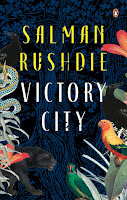Victory City by Salman Rushdie
It is amazing to see how much of real history finds its way into Rushdie's latest novel Victory City. Rushdie does his normal blending of fact and fantasy telling the story of the Vijayanagara empire that ruled over much of southern and central India between the 14th and 16th centuries. His Saleem Sinai in this case is Pampa Kampana, a nine-year girl who witnesses a mass Sati when the Kampili empire falls to Muslim invaders. As she watches her mother walk into the flames she vows she will never let something like that happen ever again. Her vow is backed by a divine power that gives her a life span exactly matching that of the Vijayanagara empire - and she proceeds to build it from the ashes of the battle of Kampili. We hear her story as she pens it down in her JayaParajaya epic and it is this creation that outlives her empire. It also forms the basis of the book, the author tells us.
Bisnaga is the name she gives the city she births, and we follow the story wide-eyed with wonder - from the first rulers Hukka and Bukka (Harihararaya I and Bukkaraya I), through the golden age of Devaraya II, the fall of the Sangama dynasty and the rise of the Tuluva dynast with Krishnadevaraya as the shining pinnacle of the empire. Through it all, Rushdie does his trademark magic - enchanted forests and talking animals, seeds that grow a full-fledged city, whispered stories turning real, metamorphoses and soothsaying. He also has wicked fun with his allusions - the three sons of Bukka are named after famous Karnataka cricketers, two brothers Narayan and Laxman, enter the story somewhere, Pampa Kampana cannot distinguish between the foreign travellers she falls in love with (all these white men look the same to her!), pink monkeys invade a forest after turning the native inhabitants against each other. Rushdie does Rushdie very well indeed.
And yet... this book feels different. For one, it is a linear story, unusual for a Rushdie novel. And while his writing continues to enthrall, I miss his incredible word play that can stop you in your tracks, marveling at his command of the language. It is far more sedate - in some ways a dilution of the classic Rushdie novel.
But I will not complain. His themes remain constant - the need for syncretism and tolerance for cultural differences, the love of art and poetry and architecture and everything that gives joy to human life, and ultimately the belief in the power of stories and words. We need the re-iteration of these themes in our polarized world and every Rushdie novel is one. Heck, his life is one.
Victory City makes me long to go see Hampi. It also makes me grateful that there is still a Rushdie in our midst, continuing to spin his yarns, making magic as he goes along.


No comments:
Post a Comment